International technical support Newsletter No 20, July 2023
- Éditorial
- Publication of issue 117 of the Statéco journal
- Programming of 2023 activities in Maghreb countries
- Support for the consolidation and enlargment of national accounts in Tunisia
- A bilateral cooperation project in support of ANSADE in Mauritania
- Involvement of the Department of Statistical and International Coordination in the International Association for Official Statistics Conference
- New countries showing an interest in the ERETES software
- A summary of INSEE's cooperation activities in the first half of 2023
- Regional Activities
- Sub-Saharan Africa
- The Maghreb and Mediterranean Basin
- South America
Éditorial
Statéco celebrated its 50th anniversary in2022; half a century of capitalising on knowledge of statistical methodologies for developing countries. The 2023 edition presents an opportunity to take stock of the evolution of the journal since its inception, of the state of statistics and statistical training in Africa and of technical assistance in a number of areas. This newsletter therefore opens with an introduction to this new retrospective issue.
Next, we look at the programming of activities with the three Maghreb countries, as well as the continuation of the New Base project with Tunisia's NSI, which aims to consolidate and expand the country's national accounts. Since early 2023, Mauritania's NSI has been the subject of another key support project covering a number of strategic areas.
This issue continues with a presentation of the discussions currently under way with a number of countries that have expressed an interest in the ERETES national accounts software. We then go on to present the activities of the Department of Statistical and International Coordinationat the 17th Conference of the International Association for Official Statistics (IAOS), together with a detailed list of activities performed during the first half of 2023.
We could not end this editorial without mentioning Jean-Pierre Cling, head of INSEE's Department of Statistical and International Coordination since 2017. Until now, the International Technical Support Division has been benefiting from his extensive experience in international technical cooperation and his involvement in development research that has been a feature throughout his professional life. We would like to thank him and wish him an excellent retirement, and would also like to welcome his successor, Olivier Biau, former Director of the École nationale de la statistique et de l’analyse de l’information (National School for Statistics and Information Analysis).
Publication of issue 117 of the Statéco journal
The Statéco journal, co-edited by INSEE in collaboration with the Institut de recherche pour le développement (Ouvrir dans un nouvel ongletFrench National Research Institute for Sustainable Development – IRD) and Ouvrir dans un nouvel ongletAFRISTAT (the Economic and Statistical Observatory for Sub-Saharan Africa), was established in 1972. This edition takes stock of the journal's contribution to overall economic and statistical methodology, largely in Africa, as well as advances made by African statistics in a number of key areas, training, and a few examples of contributions made by French and international technical cooperation.
The first article in this special issue analyses the ways in which the topics and the participation of the journal's authors have changed over the past half century. It demonstrates the richness and diversity of the topics covered, as well as the gradual increase in the presence of authors from developing countries, more specifically from African countries, which has become very noticeable since the 2000s. The next two articles focus on national accounts in sub-Saharan Africa and Tunisia, respectively, and demonstrate the importance of cooperation in this strategic area when it comes to measuring the national economies of developing countries. The article on the state of reform of the national statistical systems in the French-speaking countries of sub-Saharan Africa demonstrates the progress made and the road ahead. The next article provides a lucid analysis of the results of the European Union's statistical support projects in Burkina Faso, highlighting their successes, while also identifying what caused the failures that occurred. Finally, the last article traces the history of the links between African and French statistical schools, which are gradually transforming into a true partnership.
Programming of 2023 activities in Maghreb countries
Carried out in late 2022 and early 2023, the programming missions in the national statistical institutes of the three Maghreb countries made it possible to take stock of past and future activities.
In Algeria, the discussions have resulted in an inventory and the identification of capacity building levers, particularly in the areas of national accounts, communication and regional and social statistics.
In Tunisia, the consultations resulted in the identification of key areas for collaboration: continuation of the New Base 2 national accounts project (see below), business outlook surveys, quality of business statistics and communication.
Finally, in Morocco, INSEE has been involved in the provision of significant support to the High Commission for Planning (HCP) as part of the EU's Hakama II (2021–2024) project: regional statistics, business statistics and mixed-mode collection of household surveys. 2023 must therefore mark significant progress in the reform of the HCP's governance and regional publications, as well as in the implementation of post-collection checks for structural business surveys. This is also the year in which the results of two surveys conducted with support from INSEE will be used: the survey conducted by the Eastern Region Directorate among the unemployed, a pilot survey aimed at boosting local capacities for conducting surveys, and the new section of the national employment survey, conducted by telephone to test this collection method.
2023 also sees the launch of a national accounts project in Morocco looking at balance sheets, digital economy, agriculture and regional accounts.
Support for the consolidation and enlargment of national accounts in Tunisia
From the European twinning (2016–2018) to the completion of the benchmark year change activities within the scope of bilateral cooperation (New benchmark year project, 2019–2021), working together with Banque de France, INSEE was heavily involved in national accounts at the Tunisian NSI. The most recent publication by the NSI in this regard is testament to its success: the Ouvrir dans un nouvel ongletNational Accounts 2017–2021 were presented according to the benchmark year 2015 (March 2023).
In 2023 and 2024, the second part of this bilateral project will focus on the consolidation of the new benchmark yearand on the enlargment of the accounts to complete balance sheets, as well as the development of a satellite accounts system. A mission undertaken in March provided an in-depth assessment of the implementation of previous decisions: current campaign of accounts(benchmark year 2015), use of the 2022 micro-entreprises survey, evaluation of employment, integration of balance sheets, situation with regard to satellite accounts, revision of the SNA and prospects for the next benchmark yearchange. Support will also be provided for the establishment of quarterly accounts and backcasting.
A bilateral cooperation project in support of ANSADE in Mauritania
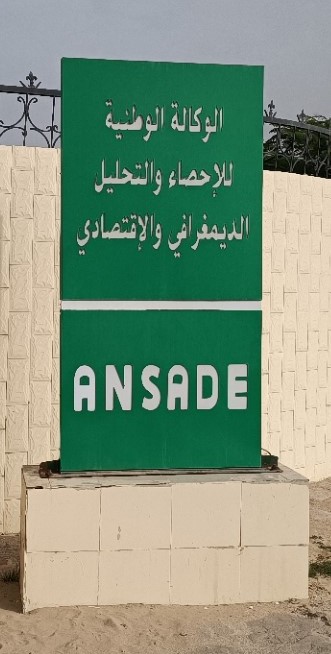
Following an initial mission and the drafting of an action plan in late 2022, the first half of 2023 saw the commencement of the implementation of the project. The work, coordinated by a senior advisor in collaboration with INSEE's International Technical Support Division, is characterised by its specific nature, which is aligned to ANSADE's needs. Multiple activities are therefore being carried out simultaneously: in addition to remote discussions and document revisions, working sessions are also being carried out as videoconferences or face-to-face. The second mission, which took place in February, focused on a number of topics, including governance and human resources, quality processes and their monitoring, regional actions, dissemination and communication, and the monitoring of the transformation of the legal framework for official statistics.
The members of the project steering committee expressed their satisfaction with regard to the work carried out and the schedule of future actions during its first meeting.
Involvement of the Department of Statistical and International Coordination in the International Association for Official Statistics Conference
INSEE's Department of Statistical and International Coordinationtook part in the 17th conference of the International Association for Official Statistics (Ouvrir dans un nouvel ongletIAOS), which took place from 4–6 April 2023 in Livingstone, Zambia.
Dominique Francoz organised and presided over a session on innovations in the use of administrative data and new data sources for monitoring the 2030 UN and 2063 African Union agendas. This session highlighted some of the activities undertaken within the scope of the PAS2 (Pan African Statistics 2) programme, funded by the European Union, to which INSEE contributes. In particular, the project aimed at organising a hackathon (in late 2023) for statisticians from African NSIs as part of an activity on the use of alternative data sources was discussed. She also participated in a roundtable organised by the UK's ONS (Ouvrir dans un nouvel ongletOffice for National Statistics) with the title: "Why should we promote access by women to high-level jobs within national statistical institutes in Africa, and how can we do so?".
Cristina D’Alessandro presented the Conseil national de l’information statistique (French National Council for Statistical Information – Ouvrir dans un nouvel ongletCNIS), its role in the consultations between the producers and users of official statistics in France, how it operates and its recent developments, particularly in the area of sustainable development. Her presentation prompted questions about the way in which this consultation framework can be adapted to African contexts and the challenges that CNIS faces.
Finally, Clément Delecourt presented the results of research carried out together with Jean-Pierre Cling into the interconnections between the Sustainable Development Goals (SDGs) at global level. Based on monitoring data provided by the UN, these studies identify the existing synergies between the SDGs and characterise the two main underlying dimensions of global development identified: human development, on the one hand, and environmental protection coupled with the reduction of inequality (and in particular gender inequality) on the other hand. Their studies also highlight the homogeneity of African countries, when compared to the rest of the world, with regard to SDG monitoring data.
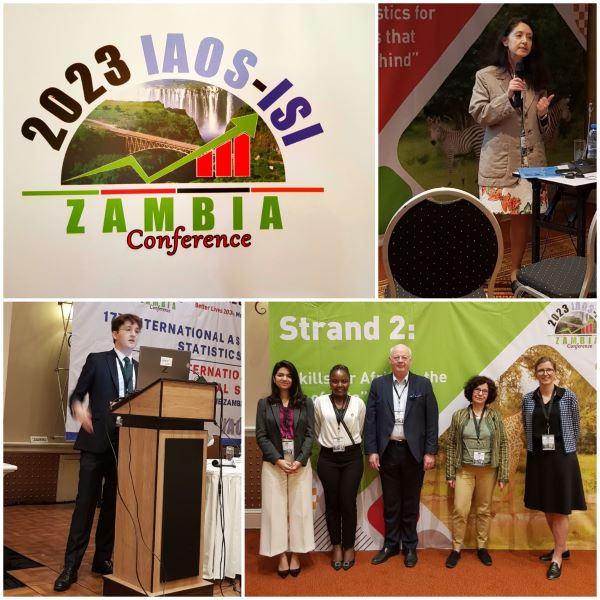
Cristina D’Alessandro and Clément Delcourt (Insee) ; the participants in the session
organised by
Dominique Francoz (Insee, fourth from the left)
New countries showing an interest in the ERETES software
In December 2022, as part of the EU PAS2 programme, a hands-on workshop to introduce ERETES was held in Abuja, Nigeria, for statisticians from Nigeria, Liberia and Sierra Leone. Collaboratively led by INSEE and AFRISTAT experts, this workshop aimed to present the software to the national accountants of these three English-speaking countries, to allow them to try it out for themselves during a practical day and also to take stock of the accounts compiledin each of the three countries:scope, method used, benchmark yearyear, available sources and large-scale statistical operations planned in the short term. At the end of this workshop, all three countries expressed an interest in ERETES. The implemntationof the software will begin in June 2023 in Liberia and may begin in the second half of 2023 in Sierra Leone.
Contact has also been made with the national statistical institute of Madagascar, where an initial audit of sources will take place before the end of this year. Finally, support has been requested from INSEE by the Bolivian NSI, for which studies are currently being carried out.
In parallel with these new prospects, work to implementation ERETES out at the Tunisian NSI is still under way: the next mission will take place in July and will aim to complete the loading of the t years that have already been closed, into the software database. This mission will also present an opportunity to start working with a new international technical expert recruited from French Polynesia through French cooperation and assigned to the African Union Institute for Statistics (Ouvrir dans un nouvel ongletSTATAFRIC) for two years.
A summary of INSEE's cooperation activities in the first half of 2023
Regional Activities
-
Pan-African Statistics Programme (PAS2)
EU-funded project benefiting African countries
Fifth coordination meeting of NSIs involved in the two Eurostat grants (INSEE, Instituto Nacional de Estadística - España, Statistics Denmark, Statistics Finland, Statistics Norway, Statistics Poland)
Mission in Oslo (Norway)
March
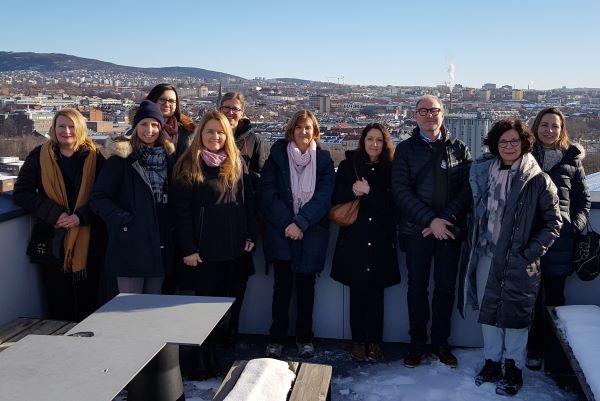
NSI representatives implementing EU grants for PAS2
-
Paris21 – INSEE - AFRISTAT – UNECA series of themed conferences
Statistical dissemination and literacy through the use of new media
French-speaking countries in sub-Saharan Africa and the Maghreb region
Webinar
February
-
International Association for Official Statistics
Participation in the 17th conference of the International Association for Official Statistics (IAOS)
Mission in Livingstone (Zambia)
April
Sub-Saharan Africa
-
Central Bank of West African States (BCEAO)
Company profiling
Videoconferences
April
Estimate of quarterly accounts
Videoconferences
June
-
MAURITANIA
Bilateral agreement with the Agence nationale de la statistique et de l'analyse démographique et économique (Ouvrir dans un nouvel ongletNational Agency for Statistics and Demographic and Economic Analysis – ANSADE), a project funded by the Agence française de développement (French Development Agency)
Human resources, governance, quality, regional action
Mission in Nouakchott
February
Human resources, quality process on the economic situation
Videoconferences
April, May
-
AFRISTAT, GABON, EQUITORIAL GUINEA
Quality of statistical processes
Videoconferences
January, April
-
AFRISTAT – EXPERTISE FRANCE – INSEE – FERDI – DGFiP – DGDDI
Steering Committee for the DATAFID project
Videoconferences
March, June

-
AFRISTAT
Planning and creation of policy briefs
Training of trainers in Abidjan (Ivory Coast)
May
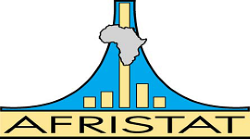
-
AFRICAN CAPACITY BUILDING FOUNDATION
Exploration of avenues for cooperation between ACBF and INSEE
Mission in Harare (Zimbabwe) at the headquarters of the African Capacity Building Foundation (Ouvrir dans un nouvel ongletACBF)
April

-
CAMEROON
Service price indices
Videoconference
June
-
LIBERIA
Training in national accounts and the ERETES software
Mission in Monrovia
June
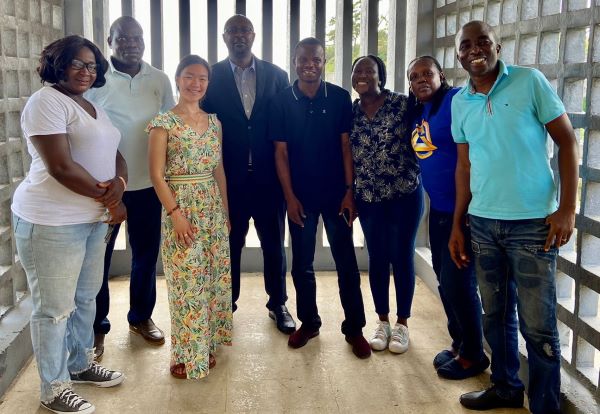
From left to right: Threacher Bedell and Rudi Vinton
(Liberia Institute for Statistics and Geo-Information Services-LISGIS),
Alice Tchang (Insee), Erith Nghogue (Ouvrir dans un nouvel ongletNational Institute of Statistics, Cameroon),
Clarence Lamie, Edith Arkuwaille, Monica Baryor et François David (LISGIS)
-
DJIBOUTI
Training in editorial techniques and auditing of statistical and economic publications
Mission to the Direction de l’économie et du plan (Directorate of Economy and Planning) in Djibouti
May
The Maghreb and Mediterranean Basin
-
ALGERIA, TUNISIA
2023 programming missions
Office of National Statistics (Algeria), National Statistical Institute (Tunisia)
Missions
January, February
-
MOROCCO
Ouvrir dans un nouvel ongletHakama II project on European funding, 2020–2024
Boosting the capacities of the High Commission for Planning

Strengthening of the technical capabilities of outside services – creation of an organisational
model for regional offices
Responses to the need to highlight local public policy issues: decision made to conduct
a pilot study looking at local partnerships at the Regional Office of Tangier
Videoconferences with the Pays de la Loire Regional Office
March, June
Overhaul of the System for Producing Business Statistics
Establishment of post-collection checks for structural business surveys
Videoconferences
April, May
National accounts
Balance sheets, digital economy, agriculture and regional accounts
Videoconferences, mission
April, May, June
- TUNISIA
Internal communication
Relaunch of the project to overhaul the NSI's Intranet
Videoconference
January
New Base 2 project: expansion of the new base to Tunisian national accounts
Review of accounts in current years and link to base years
Evaluation of jobs
Integration of balance sheets
Expansion to include satellite accounts
Videoconferences and mission in Tunis
January, March, May
South America
-
BOLIVIA
Project to modernise the Bolivian national accounts
Provision of support to the Instituto Nacional de Estadística in Bolivia financed by the Agence française de développement (Ouvrir dans un nouvel ongletAFD)
Videoconference
April



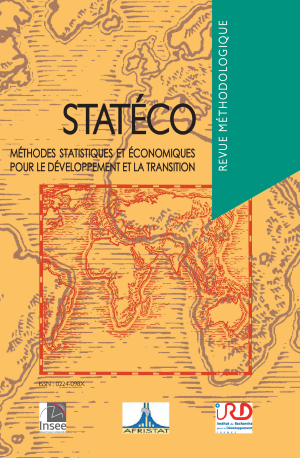
In 2022, INSEE and the Agence nationale de la statistique et de l'analyse démographique et économique de Mauritanie (Mauritania's National Agency for Statistics and Demographic and Economic Analysis – Ouvrir dans un nouvel ongletANSADE) entered into a bilateral cooperation agreement to implement a technical assistance project funded by the Agence française de développement (Ouvrir dans un nouvel ongletAFD). The work commenced in September 2022. This partnership follows the significant reform of the Mauritanian statistical system, which took place in early 2021, and responds to the need for ad hoc technical assistance in strategic areas such as for legal and institutional issues and governance, as well as for dissemination and the quality of production processes, among other things.